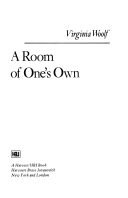Quotes from book
A Room of One's Own

A Room of One's Own is an extended essay by Virginia Woolf, first published in September 1929. The work is based on two lectures Woolf delivered in October 1928 at Newnham College and Girton College, women's constituent colleges at the University of Cambridge.An important feminist text, the essay is noted in its argument for both a literal and figurative space for women’s writers within a literary tradition dominated by men.

“Women and fiction remain, so far as I am concerned, unsolved problems.”
Source: A Room of One's Own

Source: A Room of One's Own (1929), Ch. 3, pp. 43-44
Context: Fiction is like a spider's web, attached ever so lightly perhaps, but still attached to life at all four corners. Often the attachment is scarcely perceptible; Shakespeare's plays, for instance, seem to hang there complete by themselves. But when the web is pulled askew, hooked up at the edge, torn in the middle, one remembers that these webs are not spun in midair by incorporeal creatures, but are the work of suffering human beings, and are attached to the grossly material things, like health and money and the houses we live in.

“Anything may happen when womanhood has ceased to be a protected occupation.”
Source: A Room of One's Own

Source: A Room of One's Own (1929), Ch. 6, pp. 117-118
Context: My belief is that if we live another century or so — I am talking of the common life which is the real life and not of the little separate lives which we live as individuals — and have five hundred a year each of us and rooms of our own; if we have the habit of freedom and the courage to write exactly what we think; if we escape a little from the common sitting-room and see human beings not always in their relation to each other but in relation to reality; and the sky, too, and the trees or whatever it may be in themselves; if we look past Milton's bogey, for no human being should shut out the view; if we face the fact, for it is a fact, that there is no arm to cling to, but that we go alone and that our relation is to the world of reality and not only to the world of men and women, then the opportunity will come and the dead poet who was Shakespeare's sister will put on the body which she has so often laid down. Drawing her life from the lives of the unknown who were her forerunners, as her brother did before her, she will be born. As for her coming without that preparation, without that effort on our part, without that determination that when she is born again she shall find it possible to live and write her poetry, that we cannot expect, for that would be impossible. But I maintain that she would come if we worked for her, and that so to work, even in poverty and obscurity, is worth while.

Source: A Room of One's Own (1929), Ch. 2, p. 35
Context: Life for both sexes — and I looked at them, shouldering their way along the pavement — is arduous, difficult, a perpetual struggle. It calls for gigantic courage and strength. More than anything, perhaps, creatures of illusion as we are, it calls for confidence in oneself. Without self-confidence we are as babes in the cradle. And how can we generate this imponderable quality, which is yet so invaluable, most quickly? By thinking that other people are inferior to one self. By feeling that one has some innate superiority — it may be wealth, or rank, a straight nose, or the portrait of a grandfather by Romney — for there is no end to the pathetic devices of the human imagination — over other people.

Source: A Room of One's Own (1929), Ch. 1, p. 4
Context: When a subject is highly controversial — and any question about sex is that — one cannot hope to tell the truth. One can only show how one came to hold whatever opinion one does hold. One can only give one's audience the chance of drawing their own conclusions as they observe the limitations, the prejudices, the idiosyncrasies of the speaker.

“One cannot think well, love well, sleep well, if one has not dined well.”
Source: A Room of One's Own (1929), Ch. 1, p. 18
Context: The human frame being what it is, heart, body and brain all mixed together, and not contained in separate compartments as they will be no doubt in another million years, a good dinner is of great importance to good talk. One cannot think well, love well, sleep well, if one has not dined well.